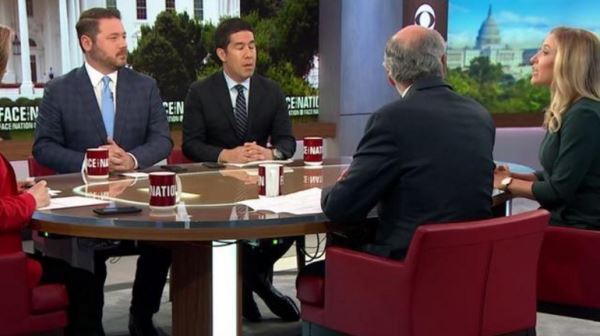Coming off a contentious NATO summit and a trip to the U.K. in which he seemed to undercut the government of America's closest ally, President Trump took aim at another Western institution just days before his high-stakes meeting with Russian President Vladimir Putin.
In an interview with "CBS Evening News" anchor Jeff Glor in Scotland on Saturday, President Trump named the European Union -- comprising some of America's oldest allies -- when asked to identify his "biggest foe globally right now."
"Well, I think we have a lot of foes. I think the European Union is a foe, what they do to us in trade. Now, you wouldn't think of the European Union, but they're a foe. Russia is foe in certain respects. China is a foe economically, certainly they are a foe. But that doesn't mean they are bad. It doesn't mean anything. It means that they are competitive," Mr. Trump said at his golf club in Turnberry, Scotland.
"I respect the leaders of those countries. But, in a trade sense, they've really taken advantage of us and many of those countries are in NATO and they weren't paying their bills," he added.
On Sunday, British Prime Minister Theresa May told the BBC that Mr. Trump had encouraged her to "sue the EU" rather than negotiate over the U.K.'s departure from the bloc. May's conservative government is deeply split over her handling of Brexit, and her hold on power was further weakened by Mr. Trump's comments to a British tabloid that her approach had likely "killed" any chance of a new trade deal with the U.S. once Brexit is complete. (Mr. Trump tried to walk back his criticism in a joint press conference on Friday.)
At the summit of NATO allies in Brussels last week, Mr. Trump took a hard line toward member nations for failing to meet targeted defense spending goals. He claimed his tough stance had paid off in getting allies to spend more on defense,telling reporters on Thursday that members had "upped their commitments and I am very happy."

The president kicked off the NATO summit by blasting Germany as "totally controlled" and "captive by Russia" over a natural gas pipeline project, known as the Nord Stream 2. The U.S. fears the deal could give Moscow greater leverage over Western Europe. In Saturday's interview, the president reiterated the criticisms he made in Brussels.
"Germany made a pipeline deal with Russia. Where they're going to be paying Russia billions and billions of dollars a year for energy, and I say that's not good, that's not fair. You're supposed to be fighting for someone and then that someone gives billions of dollars to the one you're, you know, guarding against. I think it's ridiculous, so I let that be known also this time," Mr. Trump told Glor. "I'll tell you what, there's a lot of anger at the fact that Germany is paying Russia billions of dollars. There's a lot of anger. I also think it's a very bad thing for Germany. Because it's like, what, are they waving a white flag?"
German Chancellor Angela Merkel, who grew up in communist East Germany, told reporters after the president's comments in Brussels that she had "experienced myself how a part of Germany was controlled by the Soviet Union" and said her country today made "independent policies" and "independent decisions.
In the CBS News interview, Mr. Trump also continued to criticize the special counsel's Russia investigation, saying it is having an impact on America's standing in the world. "I think we're greatly hampered by this whole witch hunt that's going on in the United States," the president said. "I think it hurts our relationship with Russia. I actually think it hurts our relationship with a lot of countries. I think it's a disgrace what's going on."
Mr. Trump heads to Helsinki on Sunday ahead of his meeting with Putin on Monday. He told Glor he has "low expectations" for the summit. "Nothing bad is going to come out of it, and maybe some good will come out," he said.
More here